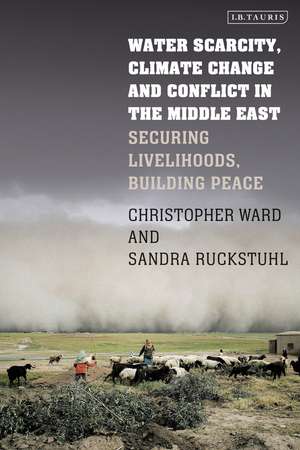Water Scarcity, Climate Change and Conflict in the Middle East: Securing Livelihoods, Building Peace
Autor Christopher Ward, Sandra Ruckstuhlen Limba Engleză Paperback – 25 dec 2019
| Toate formatele și edițiile | Preț | Express |
|---|---|---|
| Paperback (1) | 234.09 lei 6-8 săpt. | |
| Bloomsbury Publishing – 25 dec 2019 | 234.09 lei 6-8 săpt. | |
| Hardback (1) | 719.02 lei 6-8 săpt. | |
| Bloomsbury Publishing – 26 iun 2017 | 719.02 lei 6-8 săpt. |
Preț: 234.09 lei
Preț vechi: 298.81 lei
-22% Nou
Puncte Express: 351
Preț estimativ în valută:
44.80€ • 47.10$ • 37.01£
44.80€ • 47.10$ • 37.01£
Carte tipărită la comandă
Livrare economică 17 aprilie-01 mai
Preluare comenzi: 021 569.72.76
Specificații
ISBN-13: 9780755601073
ISBN-10: 0755601076
Pagini: 368
Ilustrații: 30 bw integrated
Dimensiuni: 156 x 234 x 18 mm
Greutate: 0.51 kg
Editura: Bloomsbury Publishing
Colecția I.B.Tauris
Locul publicării:London, United Kingdom
ISBN-10: 0755601076
Pagini: 368
Ilustrații: 30 bw integrated
Dimensiuni: 156 x 234 x 18 mm
Greutate: 0.51 kg
Editura: Bloomsbury Publishing
Colecția I.B.Tauris
Locul publicării:London, United Kingdom
Notă biografică
Christopher Ward is Honorary Research Fellow at the Institute of Arab and Islamic Studies, University of Exeter. He was educated at Whitgift, and at St John's College, Oxford and St Antony's College Oxford. Formerly with the World Bank, working largely in the field of natural resource management and rural development in the Middle East and Africa, he is currently consultant to a number of international organizations, including the World Bank and the United Nations Food and Agriculture Organization. He has lived in Yemen, Morocco, Saudi Arabia, Iran and Somalia, as well as Kenya, Madagascar and the USA. He is the author of The Water Crisis in Yemen: Managing Extreme Water Scarcity in the Middle East (I.B.Tauris, 2015).Sandra Ruckstuhl is a social development specialist who works with the World Bank, United Nations and US Government to improve conflict sensitivity of international development and humanitarian aid initiatives in the Middle East, Africa and Asia. She has specialized field experience supporting water and natural resource management projects, and has conducted analysis and provided operational guidance for programmes in more than 20 countries. She holds a PhD in Conflict Analysis and Resolution. She currently serves as Senior Social Specialist, Global Water Practice, WorldBank, supporting programs in fragile, conflict-affected and transboundary contexts, and as Program Manager for the UN Sustainable Development Solutions Network's USA Sustainable Cities Initiative.
Cuprins
Contents Introduction: Background on the Middle East & North Africa regionThe countries of the regionA varied set of countries Wide structural differences and diverse natural endowmentsGlobal and regional trendsSluggish growth, poor fiscal outlook and low investor confidence Trade and food security Political change Demographic trends and pressures The effects of conflictWater in the regionWater scarcity is a common thread Demographic pressures are contributing to scarcity Economic changes are also exacerbating scarcity The faint but clear voice of the environment and of water's ecological services Water scarcity and climate change Water scarcity and the need for an integrated approachAgricultureThe importance of agriculture in the Middle East & North Africa Pressures on agriculture Agriculture and water scarcity Agriculture and climate change Competition for water and the case for transfer of water out of agriculture Agriculture and rural poverty Perceived links between water, agriculture and food securityWater and conflictPART I: CHALLENGESChapter 1: The challenge of water and agriculture and the drivers of water scarcity Water resources and usesWater uses by sectorClimate and farming systemsThe contribution of agricultureFood security and agricultural water managementFood production and consumption in the Middle East & North Africa Food security and insecurity Impacts of conflict on food security Can food insecurity drive conflict? Links between agriculture and food securityRecent trends: an agriculture already under stressLand and water use in agriculture Productivity, technology and innovation Market orientation Policies, institutions and public goods Agricultural heritage and conservationIrrigation in the Middle East & North AfricaThe importance of irrigation in the region Agricultural water withdrawals Types of irrigation in the regionDrivers of scarcity and the challenge of water for agricultureChapter 2: Climate change and its expected impacts on the farming systems of the region Climate change events anticipated in the Middle East & North AfricaExpected impacts of climate change on agricultural water and farmingWater resources Irrigation Crop and livestock yields and production Impacts by farming systemReadiness for climate changeStrategic preparednessResearch on issues of agriculture and climate changeThe region's contribution to climate changeChapter 3: Water and conflict in the Middle East and North AfricaA deadly water conflictThe nature and role of conflict in the water sector of the regionWhy does conflict so often arise over water?The nature of the resource Social and institutional specifics of water Political economy and power relations over waterTypes of water conflict in the regionA classification of transboundary conflict A classification of conflict at the national or sectoral level A classification of conflict at the local levelThe challenge of transboundary waterA fertile field for conflict in the region Scant cooperation to date Pointers for the futureConflict at the national or inter-sectoral levelConflicts over access to water and water-related services Conflict of water-related policy with other interests Conflict with environmental needs or resource sustainabilityConflict at the local levelConflicts arising from local adoption of new technology Conflict provoked by state intervention at the local levelGrowing pressures to water conflict in the regionChanges in patterns of demand Changes on the supply side The changing institutional context and power relationsWater and conflict in the Syrian crisisWater and the causes of the Syrian crisis The role of drought in the Syria crisis How could this happen in a country that has so developed its water resources for agriculture? Conclus
